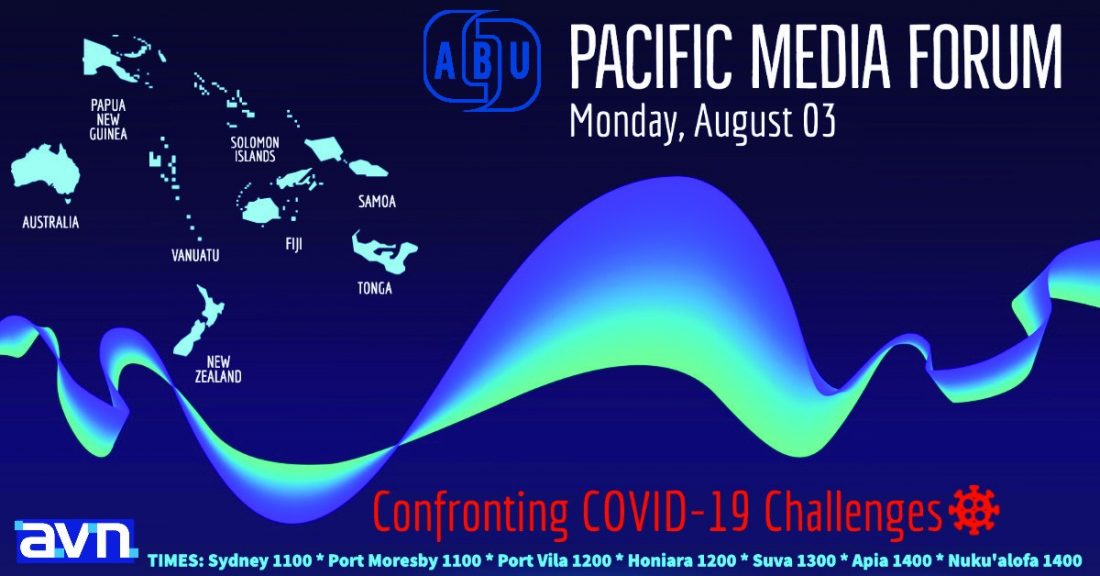
Pacific Media Forum Confronting COVID-19 Challenges – “Out of desperation comes innovation”
There might be relatively few coronavirus cases in the Pacific but the impact of closed borders has been devastating for island countries who depend on tourism for much of their income.
The CEO of the Fijian Broadcasting Corporation, Riyaz Sayed-Khaiyum, said business was terrible for the first months of the pandemic, with revenue down 80 per cent.
But by the time he was part of the Leaders Panel on the ABU’s Pacific Media Forum, Confronting COVID-19 challenges in early August, there had been a slight improvement – some part-time employees had gone, all staff had taken a 10 percent pay cut and others were taking on extra jobs.
Mr Sayed-Khaiyum joined the Vanuatu Broadcasting and Television Corporation’s CEO, Francis Herman, and Moderator David Hua, Head of International, ABC, Australia to talk about their insights and initiatives with people from around the Pacific and Asia.
“There are no magic bullets that will come out of this session by way of transformative business models and the like, but being able to have space to speak to people who are having shared experiences can be extraordinarily useful,” Mr Hua said.
Although Vanuatu is COVID-free, Mr Herman described a country reeling from the effects of three separate disasters – COVID-19, Category Five Cyclone Harold and three active volcanoes.
He said that with no extra government funds to cover the crisis, the national broadcaster was funding its coverage from savings and from sponsorship from NGOs and development partners.
“Nothing is normal now in terms of programming for television – out of desperation comes innovation. We are doing things we never thought we would do,” Mr Sayed-Khaiyum told the Webinar.
“Every day we sit down and think outside the box – what can we do differently to attract advertising dollars because at the end of the day, that is the most important thing for us.
“As a small broadcaster, ironically, it’s a bit exciting as well because we’re doing things that we have never done before.”
Mr Sayed-Khaiyum said FBC was already known for doing things out of the box but because of the pandemic, his team was becoming even more innovative: “What we would consider the norms of television broadcasting, we’re throwing little bits of it out of the window every day as we go along.”
FBC’s nightly COVID-19 program was now concentrating on inspirational stories and the broadcaster was now producing comedy shows, something it might not have done without a push from the pandemic: “There are so many lessons we can take. I know definitely that when this over, we will not do things that we used to do, at least not in the same way – we will do things differently,” Mr Sayed-Khaiyum said.
In Vanuatu, an early focus for VBTC was public health awareness campaigns to highlight the changes to culture that the pandemic required: “In Port Vila we have over 300 kava bars and there is a tendency for people to shake hands, to drink kava and spit so that transmits if there was an outbreak,” Mr Herman said.
But the triple disasters that Vanuatu faced caused its national broadcaster to reconsider the tone of its programs: “For us, it’s not just the washing hands and the social distancing, it was how we keep people’s sanity, ours included,” Mr Herman said.
“Being human beings and the national broadcaster, we had to really look inwards to see how we could balance –things like comedy came up more, they started to move up the tempo of the songs and we searched high and low for content that could entertain people to take people’s minds off the morbid awareness programs that were being run 24/7 across the media here.
“We introduced cooking shows, we talked about Independence and the movement 40 years ago; we looked at the resilience of ni-Vanuatu, the good news stories which too often we in the media forget.”
The ABU’s Director News, Wendy Everett said: “We are so grateful to the Leaders Panel and all the attendees for being part of the Pacific Media Forum COVID-19 edition – we hope it was a beacon filled with inspiration and information in these very bleak times.
“As well as talking about the issues that Pacific broadcasters are facing right now, we wanted this Forum to be a catalyst for continuing support and action.”
As the Webinar ended, the BBC World Service offered 10 episodes of a children’s current affairs program, free of-charge.
Here is a link to the full video on the ABU’s website
If streaming is easier, here is the YouTube link

